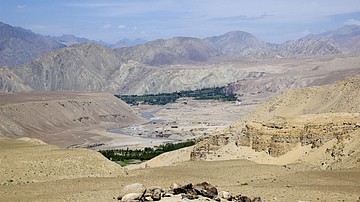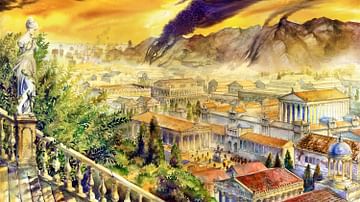Search
Search Results

Video
European Migration: Crash Course
Between 1840 and 1914 CE, an estimated 40 million people left Europe. This is one of the most significant migrations in human history. So, who was leaving Europe? And why?

Article
Polynesian Navigation & Settlement of the Pacific - Migration in Oceania
Polynesian navigation of the Pacific Ocean and its settlement began thousands of years ago. The inhabitants of the Pacific islands had been voyaging across vast expanses of ocean water sailing in double canoes or outriggers using nothing...

Definition
Aryan
Aryan is a designation originally meaning “civilized”, “noble”, or “free” without reference to any ethnicity. It was first applied as a self-identifying term by a migratory group of people from Central Asia later known as Indo-Iranians (who...

Article
Diasporic Communities in the Mediterranean & Beyond
A diaspora is a large group of people with a similar heritage or homeland who have since moved from their original homelands to another country. In terms of ethnicity, they share a common language, worldviews, myths, religious concepts and...

Interview
Interview: Bringing Down the Roman Empire in a Game
Today we are talking to Jon Shafer, lead designer of the computer game At the Gates, now available on PC, Mac, and Linux. In this game, you control a Barbarian tribe during the Migration Age, helping them survive, grow, and hopefully bring...

Definition
The Saxons
The Saxons were a Germanic people of the region north of the Elbe River stretching from Holstein (in modern-day Germany) to the North Sea. The Saxons who migrated to Britain in the 5th and 6th centuries CE along with the Angles, Frisians...

Definition
The Goths
The Goths were a Germanic tribe who are frequently referenced for their part in the fall of the Roman Empire and their subsequent rise to power in the region of northern Europe, initially in Italy. Prior to their contact with Rome they must...

Definition
Brahmanism
Brahmanism (also known as Vedic Religion) is the belief system that developed from the Vedas during the Late Vedic Period (c. 1100-500 BCE) originating in the Indus Valley Civilization after the Indo-Aryan Migration c. 2000-1500 BCE. It claims...

Definition
Romani
Romani is an umbrella term used to describe a diverse ethnolinguistic group of people with a historical presence in Europe and West Asia. The historically common term 'Gypsy' is based on the myth that they came from Egypt. In reality, the...

Definition
Romani Language
Romani is an Indo-European language, belonging to the Indic subbranch which includes Sanskrit and Hindi. Because of the Romani diaspora throughout Europe and West Asia, it developed in close contact with European and Iranian languages. It...